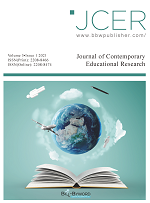Abstract
This research is based on three northeastern double first-class polytechnic universities. A total of 1628 science and engineering graduate supervisors’ resumes were referred to from an official website by the random sampling method, of which only 500 supervisors were included in consideration of complete information, key events, and time in terms of the educational background (undergraduate school, graduate school, doctoral school, number of masters, number for Dr.), early work background (number of postdocs, number of overseas visits, numbers of research work), and the growth rate (period from graduation to associate professor title). The higher education background and early work background were defined as early experience, and the database of these 500 science and engineering graduate supervisors with complete resume information from three double first-class universities in northeastern China was established. In this study, the growth rate of the growth period was divided into two at the critical period: the growth rate of the graduate supervisor to associate professors. Through stepwise multiple regression analysis, it was found that higher education background (undergraduate schools, graduate schools, doctoral schools, as well as the number of master’s and doctorate degrees) as well as early work background (number of postdoctoral work, research work, and overseas visits) have a significant impact on the growth rate of graduate supervisors to associate professors.
References
Qiao J, Chen X, Zhang, 2020, The Impact of Higher Education Experience, Early Work Experience, and First Paper on the “Dormant Period” of High-Level Talents. Degree and Graduate Education, (02): 44-53.
Zhou J, Yan H, Sun Z, 2019, Research on Career Growth Trajectory and Influencing Factors of Chinese Researchers. Science Research Management, 40(10): 126-141.
Zheng J, Wu W, 2019, The Development Characteristics and Educational Enlightenment of Potential Scientific and Creative Talents from the Perspective of Transcendent Education. Journal o Soochow University (Educational Science), 7(03): 75-82.
Zhang J, Wang J, Zhou J, et al., 2019, Research in Science. Science, 37(02): 235-244.
Wang R, 2019, Research on the Growth Law of Elite Talents from the Perspective of Talent Learning. Science and Education Guide (Late), (05): 138-139, 150.
Geng Q, Peng W, Wang Q, 2012, Research on the Quality Dimension of National Excellent Doctoral Dissertation Supervisors: Based on the Survey of 32 National Excellent Doctoral Dissertation Supervisors. China Higher Education Research, (01): 51-55.
Wu S, 2019, Can Yangtze River Scholars Be Replicated – Discussion on the Research on the Growth Law of High-Level Talents in Education Discipline. Chongqing Higher Education Research, 7(01): 121-127.
Zhang W, Chen R, Liu K, et al., 2018, A Study on the Development Characteristics of Science Foundation Supported Talents: A Case Study of Innovative Research Group Project Leaders. Science Foundation of China, 32(04): 382-386.
Eggers WD, Hagel J, 2012, The Competitiveness of Brains – Talent, Policy, and the Future of American Competitiveness, Deloitte University Press, Atlanta.
Yang S, 2012, Research on the Growth Law and Cultivation Strategy of Top Innovative Talents in Universities. China University of Geosciences.
